You know that your water softener removes hard minerals from your water and it needs to regenerate regularly to continue to soften your water. But what does a water softener do to soften your water and does a water softener need to be serviced?
Just like any mechanical appliance in your home, a water softener does need to be serviced to keep it operating properly. The brand of water softener, water characteristics, and amount of water used will dictate what needs to be serviced and how often a water softener should be serviced.
Not every water softener needs to be serviced in the same way, and some water softeners may never need to be serviced at all, but every situation is different and you should know if your water softener needs to be serviced and how often it should be serviced.
Here’s What We Will Be Covering:
- Why Does A Water Softener Need To Be Serviced?
- What Needs To Be Serviced On A Water Softener?
- What Happens If You Don’t Service Your Water Softener?
- Does A Water Softener Need To Be Serviced Yearly?
- How Can I Tell If My Water Softener Needs To Be Serviced?
- Do Some Water Softeners Require Less Service Than Others?
- Does Iron In Your Water Or Very Hard Water Mean More Frequent Water Softener Servicing?
- Will Servicing My Water Softener Regularly Make It Last Longer?
- Are There Water Softeners That Don’t Need To Be Serviced?
- Can I Service My Water Softener Myself?
- Who Should I Call To Service My Water Softener?
Why Does A Water Softener Need To Be Serviced?
A water softener relies on water flowing freely through its valves, restrictors, tubes, and of course its water softener resin tank to perform the regeneration process that allows the water softener to continue to regenerate its water softener resin which removes hard minerals from your water.

If any of the parts of your water softener that are needed to properly regenerate its water softener resin are not working properly, your water softener can become less efficient at softening your water or even stop softening your water at all.
An inefficient water softener can mean wasted water and salt, and hard water and iron getting into your home causing white crusty hard water stains and yellow staining due to iron that would have been removed from your water if it had been serviced to keep it working properly.
What Needs To Be Serviced On A Water Softener?
Servicing most water softeners often includes:
- Testing your water to make sure that your water softener is set correctly for your current water characteristics.
- Check the water characteristics settings on your water softener and make adjustments if necessary.
- Cleaning or replacing the injector/venturi.
- Cleaning or replacing the filtering screen.
- Inspecting plumbing, tubing, and part connections.
- Adding 4 ounces of resin cleaner to the brine tank is recommended.
Does A Water Softener Use Filters That Need To Be Serviced?
Although your water may look crystal clear, there could be fine sediment in your water that can clog filters, restrict water flow through openings and even cause wear and tear on the moving mechanical parts inside of your water softener.
Because sediment in water should be removed before it gets into your water softener, many water softeners utilize an external water sediment pre-filter installed before the water softener so it can be serviced as often as needed without servicing the entire water softener.
But even if your water softener has a water sediment pre-filter installed to remove sediment before it reaches your water softener, most water softeners have one or more filtering screens within the system to prevent internal parts from getting clogged.
The filtering screens that are inside of a water softener are often located inside of an area of the control valve that is accessible by bypassing and depressurizing the water softener and then removing a few screws or a removable cap.
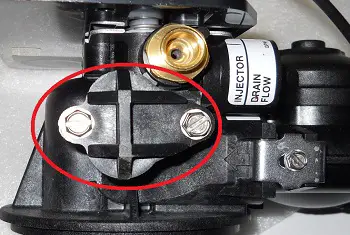
Fleck brand water softener control valve injector and screen access cap.
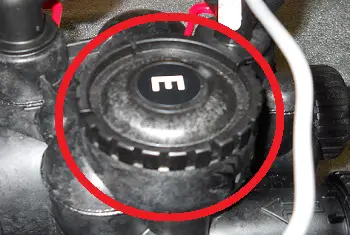
Clack brand water softener control valve injector and screen access cap.
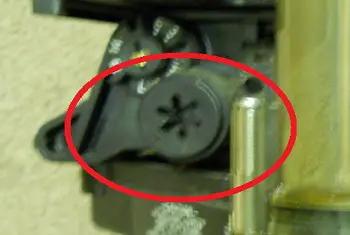
Autotrol brand water softener control valve injector and screen access cap.
Providing that the injector and screen are fully intact, they can usually be cleaned and then reused without having to replace them.
Simply rinsing the screen and injector is often enough to clear the openings in an injector and screens. If there is yellow/orange iron build-up, soak the screen and injector in an iron-out solution for a few minutes and then rinse with clean water.
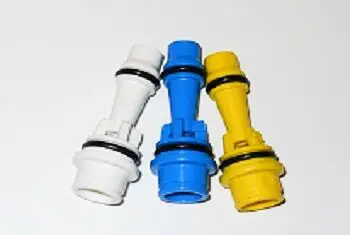
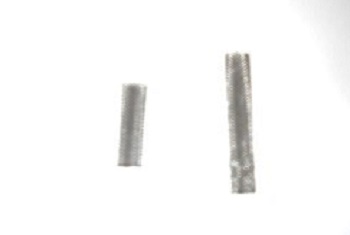
Does A Water Softeners Brine Tank Need To Be Serviced?
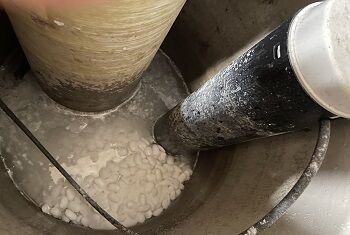
For the most part, a water softener brine tank does not require any regular servicing other than an occasional cleaning.
Some people recommend cleaning your water softener’s brine tank annually but I prefer to keep the brine tank clean on a regular basis rather than having to empty out the entire brine tank once a year.
The main thing that I recommend you do to service your brine tank is to use a very pure salt like solar salt or pellet salt.
The cleaner the salt is that you put into your brine tank, the cleaner the brine tank will be.
Wiping the inside walls of your brine tank before adding fresh salt is also a great way to remove dirt that may have gotten into your brine tank before it gets into your water softener.
What Happens If You Don’t Service Your Water Softener?
Failure to service your water softener when service is needed can lead to chalky hard water stains and yellow/orange iron staining (if you have iron in your water) that will become worse over time.
A water softener in need of service can leave brine behind in the water softener’s resin tank which means salty water in the foods that you eat and salty-tasting tap water.
Hard minerals that can pass through a water softener that is in need of service can build up inside of hot water systems and the plumbing in your home making your hot water heating system less efficient and even causing a loss of water pressure over time.
Does A Water Softener Need To Be Serviced Yearly?
How often a water softener needs to be serviced can vary from home to home.
The amount of water used and the characteristics of your water can have a big impact on whether or not you should have your water softener serviced yearly.
If you have a water sediment prefilter before your water softener to prevent sediment from getting into your water softener and your water is free of iron, you should not need to have your water softener serviced on a yearly basis.
Generally, a properly installed water softener that softens clean, iron-free water should only require servicing every 3 -5 years simply to ensure that it is set correctly for the hardness of your water.
How Can I Tell If My Water Softener Needs To Be Serviced?
It can be very difficult to tell if your water softener is in need of service because the noticeable changes in your water often change very gradually over a long period of time.
Your water may contain a small amount of hardness for a day or so before your water softener regenerates and you may not notice a change at all until you actively look for indications that your water softener may need to be serviced.
Signs that your water softener should be serviced :
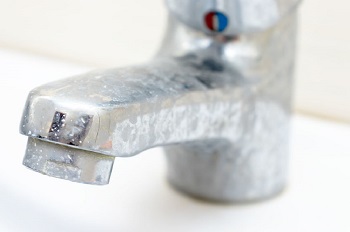
Hard water spots/film appear on your glassware and other surfaces where water settles.
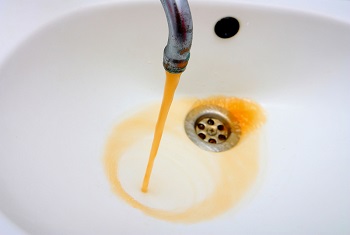
Yellow/Orange staining on sinks, bathtubs, and light-colored clothing.
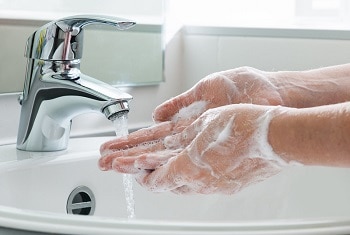
Soap is not lathering as much as it used to.

Soap scum residue on surfaces.

Dry skin and frizzy hair.
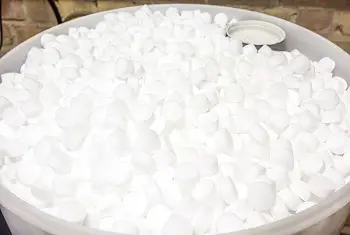
Your water softener is not using as much salt as it used to.
Do Some Water Softeners Require Less Service Than Others?
Although the characteristics of your water will have the most barring on how much service your water softener will need and how often it will need servicing, some types of water softeners tend to need service less often than others.
Very often, the biggest reason that a water softener will need to be serviced is because of sediment or iron clogging screens or openings inside of a water softener control valve.
Using a sediment prefilter to remove sediment and debris from your water before it goes into your water softener is always a good idea for any water softener.
But many water softeners can still be affected by dissolved iron from the water that gradually builds up in restrictors and on moving parts within the water softener control valve.
Some more advanced water softeners have the incoming water run through the bed of water softener resin before it goes through the control valve to remove dissolved iron and soften the water to prevent harmful effects of the untreated water in the control valve.
Not all water softeners use this process and in many cases where iron is not an issue, having the raw water go through the water softener resin first is not much of a benefit.
You should test your unsoftened water for iron to see if this water softener design may help to minimize how much and how often you will need to have your water softener service.
If you find that your untreated water is iron-free, a standard water softener will most likely not need to be serviced more often because there will be no iron build-up within the control valve of the water softener.
Does A Larger Water Softener Require Less Service That A Small One?
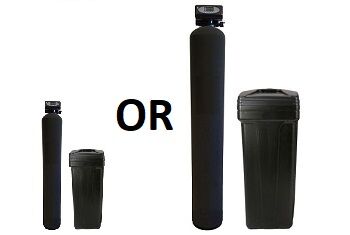
This is a question that needs to be better understood rather than just an answer as it doesn’t really have a yes or no answer.
Whether you purchase a small or a large water softener, you will be using the same amount of water either way.
So the only real benefit of getting a larger water softener is that it would not need to regenerate as often as a smaller one which may sound like a benefit. Therefore it would not need to be serviced as often, but that is not always the case.
Although the control valve of a larger water softener may not experience as much wear and tear as the control valve of a smaller water softener, the same amount of water softener resin surface area is needed and the same amount of sodium (Salt) is needed to regenerate the water softener resin.
Also, a larger water softener will generally need to be serviced just as much as a smaller water softener because both a large and small water softener will need approximately the same amount of water flowing through them to regenerate its water softener resin.
A larger water softener may regenerate less often than a smaller one, but it will require more water and salt per regeneration to properly regenerate its water softener resin.
Therefore a larger water softener will generally need to be serviced just as much as a smaller water softener.
Check Out My Article: “Can a Water Softener Be Too Big!” For More Details About Why A Big Water Softener May Not Be The Right Fit For You!
Does Very Hard Water Mean More Frequent Water Softener Servicing?
For the most part, the hardness of the water will have little effect on whether a water softener will need to be serviced and how often it will need to be serviced.
Generally, a water softener will not need to be serviced more often just because the water being treated is very hard.
Although moving parts of a water softener may wear faster if the water softener needs to regenerate more often because the water softener is treating very hard water, most hardness levels will have little effect on the injectors, and screens within a water softener valve.
Only in rare situations where the hardness is extremely high would a water softener require more frequent servicing because of the hardness in the water.
Does A Water Softener Need More Servicing When You Have Iron In Your Water?
In many cases, iron in your water will result in your water softener needing to be serviced and it may need to be serviced annually or even more frequently if the amount of iron in your water is high.
Both dissolved iron (Ferrous iron) and non-dissolved iron (Ferric iron) can block openings, clog screens, and build up on water-softener resin over time.
Regular servicing of a water softener that is treating water that contains iron may be needed to clean or replace injectors/ventures and filtering screens.
Will Servicing My Water Softener Regularly Make It Last Longer?
Because every situation is different and there are many different types of water softeners, there is no way to be sure if having your water softener serviced regularly will extend the life of the system.
In my opinion, the cost of servicing your water every year may soon exceed the cost of purchasing a brand new water softener, defeating the purpose of servicing your water softener yearly.
A water softener will need to be serviced occasionally and each circumstance is different, but having your water softener serviced every 3-5 years is often sufficient to keep the average water softener working properly and will not cost you more than a new water softener after just a few years.
Are There Water Softeners That Don’t Need To Be Serviced At All?
If your water hardness is low ( like 7 grains per gallon (119.96 ppm) or less), and your water is iron free with no other issues other than hardness, you may never need to service your water softener at all.
However, in most cases, any water softener will need to be serviced at least a few times over its lifespan.
As time goes by, the characteristics of your water can change as well as your water usage. Servicing your water softener every 3 to 5 years will help keep it working properly even if your water characteristics have changed or your water consumption has changed.
There are several things with your water softener and your water that can change over time.
- Iron levels in your water may go up or down
- Screens and injectors/ventures can clog
- Brine tank floats can go out of adjustment
- Water softener programming can be lost due to power outages
- Dirt and debris can accumulate inside the brine tank
Having your water softener serviced occasionally will make sure that these changes are addressed and corrected if needed.
There may be water softeners that are designed to never need servicing, but I highly recommend that any water softener should be serviced every 3-5 years.
Can I Service My Water Softener Myself?
If you are a little handy, good at following directions from an owner’s manual, and have some spare time, you can certainly service your water softener yourself.
But beware, most of the parts on a water softener that you will be handling when servicing a water softener are made of plastic and can break.
DON” T OVERTIGHTEN SCREWS OR USE EXCESSIVE FORCE TO OPEN OR CLOSE ANYTHING, AND IF YOU’RE NOT SURE ABOUT SOMETHING, DON’T DO IT!
You should be able to find instructions on how to service your water softener in the owner’s manual that came with your water softener.
If you don’t have the owner’s manual, you should be able to locate one online by searching the (BRAND) + (MODEL)+ the word “MANUAL”.
Inside of the owner manual should be a section on the basic servicing of your water softener which often includes four primary steps:
- Cleaning the injector or venturi on your water softener
- Cleaning the filtering screen on your water softener
- Adding a dose of resin cleaner to the brine tank
Different types of water softeners may have additional recommended steps for servicing your water softener, but in many cases, these four steps will be the most important steps that you will need to perform.
Who Should I Call To Service My Water Softener?
Many people are under the impression that just because a plumber works with water, he or she is also an expert in water treatment.
Although many plumbers are very knowledgeable in water treatment and how to service a standard water softener, there are plenty of plumbers that know very little about how to properly service a standard water softener.
If you use a plumber that you trust enough to service your water softener, great. Don’t let a plumber’s honest smile dictate whether or not you trust them to service your home’s water softener or water treatment system.
But if you want to make sure that your specific water softener is serviced properly, you should contact a local water treatment company that is well versed in your brand and model of water softener.
Questions to ask when calling to have your water softener serviced:
- Do they warranty their service and for how long?
- Do they test your water as part of the service?
- Do they regularly service your brand of water softener?
- Does the service technician that will be servicing your water softener have experience with your water softener?
There is generally no need to ask about exactly what the technician will do to perform the water softener service as different brands of water softeners may need variations of a standard service.
Prepare a short list of questions that you have about your water softener to ask the technician when they come to service your water softener.
Don’t expect all water softener technicians to know everything about every type of water softener.
If your water softener technician does not know the answer to your questions, they should know who to call to get the answer for you.
To Sum Up:
In most cases, a water softener does need to be serviced every 3 to 5 years to keep it functioning correctly so it can soften your water.
Neglecting to service your water softener often enough can lead to hard water and iron damage to water fixtures and surfaces that make contact with your water.
Understanding the characteristics of your water by testing your water can help you judge how often you need to service your water softener and what needs to be serviced in your water softener.
Not all water softeners are the same and one water softener may require different servicing than another.


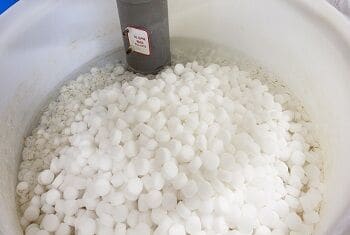

I have a Fleck 5810 that is a few years old and has quit working, it only shows ERR 4 on the display. It seems the 5810 is discontinued. Is there another control valve I can use with the existing tank? And if so, is replacing it difficult?
Hello Johnny and thank you for the question.
The Fleck 5800 series control valve is a very standard size. Most control valves will fit onto your existing tank just fine.
Both of my recommended Fleck control valves will fit your tank perfectly and they are quite simple to change.
Shut off the water going to the water softener and turn on a faucet until the water stops to release the pressure in the softener. Bypass the water softener and unplug it then carefully disconnect the plumbing, drain line, and brine line. (There will be some water spilled, but it shouldn’t be much)
Spin off the old valve counterclockwise (you may need to give many light taps with a rubber mallet to get it to start).
Make sure the threads on the tank are clean and then spin the new head on until it is snug HAND TIGHT! Only give it a few light taps with a rubber hammer if you can’t snug it up by hand. I usually spin the valve on until it stops and then I use both hands to give it another 1/4 turn or so and that should be fine.
Carefully reconnect the plumbing, drain line, and brine line then slowly turn the water back on and then take the water softener off the bypass.
Set the regeneration as directed in the owner’s manual and you should be done.
I hope this was helpful.
Paul